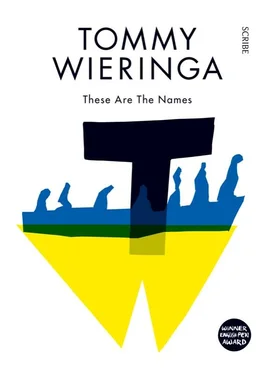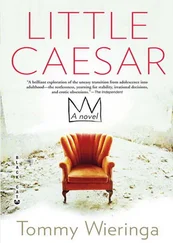The man from Ashkhabad pulled some clothes out from under Vitaly. ‘Get your lazy arse off there,’ he murmured. He handed the woman a sweater and some rags to bind up her shoes.
They slaughtered all the chickens. It was the rooster’s turn as well now. The stove glowed as new pieces of chicken were added to the spattering fat, one after the other. The night was filled with excitement and a certain fateful cheeriness that could exist as long as they were still close to the warm stove. Everyone gathered clothing and food; together they assembled enough warm clothes for Vitaly. He was the one who would carry the head, the light that would lead them through the endless night. The poacher withdrew to the bed behind the stove, his provisions within arm’s reach. He was ready for the last leg. The others checked to be sure they were properly armed against the cold — whether their satchels were sturdy enough, whether the weight was distributed evenly.
‘A few days, no more than that,’ the man from Ashkhabad said. ‘Can’t be any longer.’
‘We have the tracks,’ the boy said confidently. ‘We’ve never had tracks before. If they start somewhere, they have to end somewhere, too. Has to be.’
‘If that’s His will,’ the woman said.
The man from Ashkhabad pointed at the chicken. ‘It’s ready now.’
The boy lifted the bird from the pan by one leg. It was not nearly morning yet.
CHAPTER THIRTY-EIGHT.Snow and ice
‘And the chicken lady?’ Beg asked. ‘You just left her behind?’
‘What else could we do?’ the boy said. ‘She was really old.’
‘That’s a cruel thing to say. You owe your life to her. Couldn’t you be a little more grateful?’
The boy’s legs dangled over the edge of the bed. He’d been taken off the drip; he could move around the room freely now.
‘So what do you think happened to her?’ Beg asked.
‘How should I know?’
‘But you can probably guess, can’t you?’
‘Probably. But why should I?’
‘Because you people plundered her supplies and then left her behind, that’s why.’
‘She was crazy.’
‘Oh, so that justifies everything? Then it’s okay?’
The boy shrugged. He was in a brazen, recalcitrant mood. ‘You don’t have to act like it was easy. It was either her or us, you know?’
He was skating across the linoleum floor on his bare feet.
Touché, Beg thought. He had let himself be carried away by his pity, by the thought of the slow, lonely death of an old woman with wooden cherries in her hair.
The poacher had said something else, a clarification, a clue that revealed something about the head’s character, its personality . When the subject of the abandoned woman came up, he said: ‘We were able to go on because she was there. What do you think — you think we were in a position to turn that down?’
‘I don’t think anything. I asked you.’
The man across from him closed his eyes and massaged his forehead with his fingertips. ‘There was a good reason for us to be there,’ he said after a time. ‘We took what was coming to us. She was there for us, so that we could go on. Like in the field, where the prey exists for the hunter. That’s how I see it.’
‘That’s still how you see it?’
After a while, he said: ‘Yeah.’
‘He took you people to her …’
The poacher nodded.
‘So that you could survive.’
‘That’s right.’
‘As a sort of sacrifice? An involuntary sacrifice?’
The poacher closed his eyes. ‘Words, words,’ he murmured.
‘He was on your side; he was only there for you people. Not for some feeble-minded woman; only for you. He allowed you to rob her of everything she had because you people were his favourites, am I right? Or I have got it all wrong?’
‘Go ahead, make it all sound ridiculous, I don’t care.’
But this was precisely what fascinated Beg. The god who favoured his people above all others: he wasn’t there for all people; no, only for his people, rather like the nepotism of Semjon Blok. As far as Beg’s own god went, it was no different: he had also picked his darlings. Thousands of years later, that warm light fell on him, too, on Pontus Beg — a pleasant feeling, to be honest, one he wouldn’t have wanted to do without. No one deals lightly with his own redemption.
They left her house in the early-morning hours. The old woman was asleep in her chair, her mouth hanging open. The elastic bands had come loose, so that her grey hair hung in strands against the backrest. The floor was a carpet of feathers and down and innards; there were no chickens left.
The boy was the last to leave. He closed the door behind him. ‘Fuck,’ he said, stamping his feet on the porch. He and the others stood there a bit indecisively, as though unable to believe that they had actually left the warmth inside. The poacher had already disappeared. Like sheep ill at ease in new surroundings, they began moving, and felt how the cold took them in its grasp. Wasn’t starving beside the stove preferable to freezing to death on the steppe, the boy wondered. The cold was a physical opponent — you had to be strong and fit to stand up to it. But they were skinny and feeble; they were no match for it. These last few weeks of gorging themselves made no difference.
They walked through the village. The poacher appeared from a half-collapsed shed, carrying the bag containing the black man’s head. They formed a conference of shadows, and then the poacher stuck Vitaly’s arm through the shoulder strap and hung the bag around his neck. This was how it was meant to be: the head and the bearer united, in a passing but sacred moment. A dash of hope trickled through their insides, a rarefied outlook — the prospect of things ending well.
‘It’s time,’ the poacher said, his voice muffled by the scarf covering his face. He took Vitaly by the arm. He let himself be led along willingly, an obedient servant.
They reached the edge of the village. There they stopped, as though to muster up the final crumbs of courage. They had tied rags around their shoes, and cloths around their necks, their steaming nostrils sticking out of the textile. The world wore the nocturnal blue of enamel; ice-crystals had settled on the stalks of grass. The steppe opened up wide and dark before them. They had to brace themselves against that piercing emptiness, as much as against the cold. They started moving, the boy taking up the rear. He kicked holes in the hollow white ice between the tyre tracks.
Their footsteps crunched on the frozen layer of snow. The cold slipped through their clothes, felt its way along their limbs, and slid into their muscles and bones. It had only just started to grow light, and they were already as cold as stone. The village had dissolved behind them, a luxurious mirage. So much happiness, all that comfort — it was already more than they could imagine.
The thin snow lit up with a blue sheen at first dawn. A gradual light spread itself across the world, the sun itself remaining behind the ashen cover of cloud. Out in front went the poacher, keeping Vitaly close to him. The others could barely keep up. The head dangled against Vitaly’s back, summoning them to move on. But as the day proceeded, the distance between them grew. The boy was sent up ahead as the liaison, to ask the poacher to slow the pace until the others could catch up.
Only when darkness came did they find each other. The poacher and Vitaly were sitting by a little fire in a dip beside the road, and didn’t look up when the others approached, groaning, holding out their yearning hands until they almost touched the flames. The poacher melted snow in a pan. They drank greedily.
They ate frozen chicken and beans until their jaws burned. They didn’t have a yardstick for divvying up their supplies, because they had no idea how long their journey would last. And because surviving for more than a few days was unthinkable, they ate until they could eat no more. Then they unfolded their cardboard and mats on the frozen ground, and buried themselves in loose ends of cloth and blankets. They crawled close together in the dip. Above them, the sky was cloudy and dark — there were no stars — and beside the dying embers lay the black man’s head. They sent it their pleas and detailed imageries of salvation. The boy lay at the outer edge, not wanting to be beside Vitaly. Even though Vitaly’s brains had been ground to mush, the boy remembered who he had been. He was still inside there somewhere.
Читать дальше











